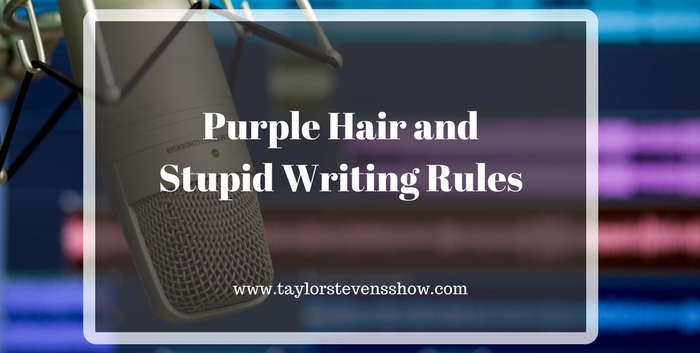
Podcast: Play in new window | Download
Subscribe: RSS
If you’re really doing it right then almost the entire narrative, that is not external dialogue is going to be internal monolog.
— Taylor
In this episode, we get caught up on Taylor’s summer, discuss The Dunning-Kruger Effect then discuss a blog post from Anne R. Allen’s blog titled, Stupid Writing Rules: 12 Bad Writing Tips New Writers Give Each Other.
It was fun discussing Ann’s 12 Bad stupid writing tips and hearing Taylor’s opinion on most of them.
Thanks so much for joining us again this week!
If you have questions or suggestions for future shows, we’d love to hear from you. You can leave your suggestions as comments or find our contact information, including our Hotline Number for listener question on the Connect page.
Please consider supporting Taylor on Patreon for Patron only teaching and information.
You may also wish to join us in the Taylor Stevens Fan Club on Facebook.
If you enjoyed this episode, please share it using the social media buttons you see on the left of the post.
Also, please leave an honest review for THE TAYLOR STEVENS SHOW Podcast on iTunes!
Ratings and reviews are extremely helpful and mean a great deal to us. They matter in the rankings of the show, and we read every one of them.
And finally, don’t forget to subscribe to the show on iTunes, Google Play, or Stitcher to get automatic updates.
one glaring counterexample to not dating books with specific references: stephen king.
I wish to make a defense in the use of italics that were discouraged in this podcast. Below is an example of how I’ve used italics:
The shopping bag slipped from Alice’s fingers. Her brother, Joey, lay sprawled on the sofa, uttering pig-like snorts asleep on the couch. Popcorn littered the carpet, beer cans crushed and strewn over her new coffee table.
I’ll kill him. I’ll kill him.
The narrative is written in third person, past tense. The thought is written in first person, present tense. The convention is to italicize.
You could either go against convention and not italicize, or you could rephrase it in order to maintain the narrative format. Perhaps there is a third and better method that I’m not seeing.
So the question to Steve as a reader is what aspect of this is jarring? Is it just the italics or the narrative switch?
And for Taylor, what would you change to avoid italics in this instance.
From my perspective, direct thoughts such as this are more immediate and impactful and tend to bring forth a more immersive and intimate experience for the reader. I’ll keep an open for alternatives, though.
Thanks for the question, Robert – We’ll answer this in a future show.